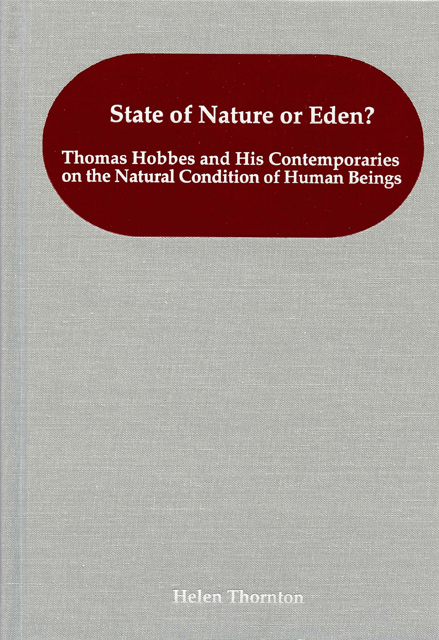 State of Nature or Eden?
State of Nature or Eden? Chapter Two - Equality and Unsociability
Published online by Cambridge University Press: 21 June 2023
Summary
‘And the LORD God formed man of the dust of the ground …’ (Genesis II.7)
HOBBES AND NATURAL EQUALITY
Hobbes’ state of nature was a condition in which human beings were equal in the sense that they had roughly equal powers. This applied to all adult men and women living in the natural condition. Hobbes admitted that there were differences of strength and intellect, but these were ‘not so considerable as that one man can thereupon claim to himself any benefit to which another may not pretend as well as he’. Differences in physical strength did not affect this equality—one human being might be physically weaker than another, but he still had the ability to kill the stronger individual, ‘either by secret machinations, or by confederacy with others that are in the same danger with himself’. Hobbes claimed that little force was necessary in order to kill another human being. And even if an individual had the utmost confidence in his own ability, he could not believe that he was naturally superior to others. Thus, those ‘who have equal power against each other, are equal; and those who have the greatest power, the power to kill, in fact have equal power’. Differences in intellectual ability also did not affect this equality. In fact, according to Hobbes, if we ignored taught intellectual ability such as rhetoric and science, and also intellectual ability, which was attained by experience such as prudence, we found that human beings were equal in ‘the faculties of the mind’. In other words, human beings were equal in those faculties of mind, which they had from birth. The reason for this was that each human being thought he was wiser than others, and this, according to Hobbes, was proof of their equality—they were equal in being contented with their share of wisdom, which they thought was greater than anyone else’s share.
Hobbes’ argument for natural equality was particularly directed against Aristotle, and his followers. Hobbes criticized Aristotle’s claim that naturally some human beings were made to serve because of their physical strength, while others were made to rule because of their intellectual ability.
- Type
- Chapter
- Information
- State of Nature or Eden?Thomas Hobbes and his Contemporaries on the Natural Condition of Human Beings, pp. 46 - 69Publisher: Boydell & BrewerPrint publication year: 2005
